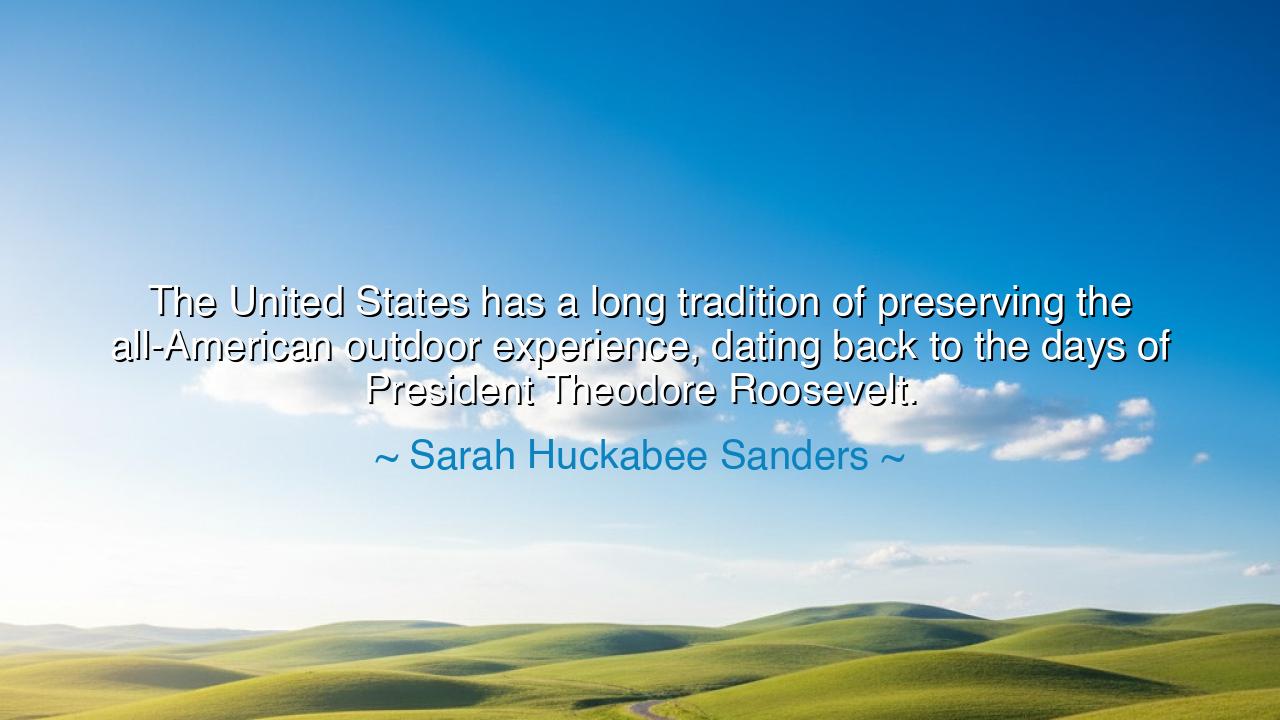
The United States has a long tradition of preserving the
The United States has a long tradition of preserving the all-American outdoor experience, dating back to the days of President Theodore Roosevelt.






When Sarah Huckabee Sanders said, “The United States has a long tradition of preserving the all-American outdoor experience, dating back to the days of President Theodore Roosevelt,” she invoked a truth rooted in both heritage and reverence for nature. Her words are not merely about policy or pastime; they call to mind a spiritual bond between the American soul and the untamed wilderness. Beneath this statement lies an acknowledgment that the outdoors — the forests, the mountains, the rivers — are not merely places of recreation, but the cradle of the nation’s strength, resilience, and freedom. To preserve them is to preserve the very essence of what it means to be American.
The origin of this idea reaches back to the early twentieth century, when President Theodore Roosevelt, a man of immense vigor and vision, stood as one of the greatest champions of the natural world. He believed that the health of a nation depended upon its relationship with the land — that the people must remain close to the earth to remain strong in spirit. It was Roosevelt who first declared, “The conservation of natural resources is the fundamental problem. Unless we solve that problem, it will avail us little to solve all others.” He did not see the wilderness as something to be conquered, but as something to be stewarded — a sacred inheritance to be passed on, not consumed. Thus began a tradition that Sanders invokes: the belief that to walk beneath the open sky is to touch the roots of liberty itself.
To the ancients, the wilderness was the proving ground of character. In the vastness of creation, the human soul discovered humility, courage, and clarity. When Moses climbed Mount Sinai, when Siddhartha sat beneath the Bodhi tree, when Jesus wandered the desert, each found truth in the stillness of the natural world. Likewise, the early Americans — frontiersmen, farmers, pioneers — were shaped by the outdoors, their identity forged by the challenge and beauty of the land. The forests and plains were not mere backdrop, but teacher and companion. The “all-American outdoor experience,” as Sanders describes it, is therefore not a luxury of leisure but an inheritance of spirit — one that connects the modern citizen to the virtues of endurance, simplicity, and gratitude.
In Theodore Roosevelt, this ancient ideal was reborn. He hunted and hiked not merely for sport, but for understanding. When he journeyed through the rugged plains of North Dakota after the death of his wife and mother, he found solace in the wild, and from that pain arose a vision that would change a nation. Out of his reverence for the land came the establishment of national parks, wildlife refuges, and conservation laws, protecting millions of acres for generations unborn. His actions were not acts of preservation alone; they were acts of hope — a belief that the land itself carries the power to heal and to unify.
Sanders’s invocation of Roosevelt, then, is more than a political reminder — it is a moral inheritance. It calls upon Americans to remember that their national identity is not built upon cities or machines, but upon the soil, the river, the mountain, and the sky. The “all-American outdoor experience” is not only about adventure; it is about belonging — to the earth, to community, to history. It is a recognition that the wilderness still speaks, and that to lose it is to lose a part of ourselves. In an age of glowing screens and hurried days, her words echo like an ancient call: return to the land, and remember who you are.
From this truth springs a lesson for all generations: to preserve nature is to preserve the spirit of freedom. The ancients taught that the land and its people are bound by sacred covenant — if one thrives, so does the other. Let every family walk the trails, breathe the mountain air, and gaze upon the stars, for in those moments, they touch something eternal. Let leaders, too, remember that power is fleeting, but the rivers and forests endure — if only we choose to protect them.
Thus, as Sarah Huckabee Sanders reminds us, the legacy of Theodore Roosevelt is not confined to history books. It lives in every sunrise over the Grand Canyon, in the cry of the eagle above Yellowstone, in every child who skips a stone across a clear stream. To honor that legacy is to act — to cherish, to conserve, to step outside and see the divine written upon the face of the earth. For as the ancients and the wise have always known, the greatest teacher is not the city nor the school, but the wilderness — where the heart remembers that it is small, and yet deeply, wondrously alive.






AAdministratorAdministrator
Welcome, honored guests. Please leave a comment, we will respond soon